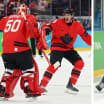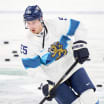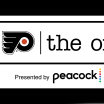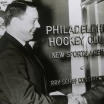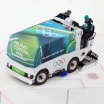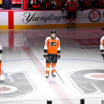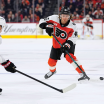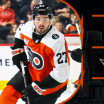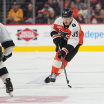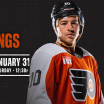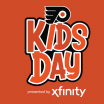Flyers general manager Chuck Fletcher did a series of interviews on Monday with members of the local media, discussing a variety of issues associated with the team during the NHL's schedule pause due to the global coronavirus pandemic.
7 Takeaways from Fletcher Conference Call
Flyers GM Chuck Fletcher discusses the NHL's schedule pause due to the global coronavirus pandemic.
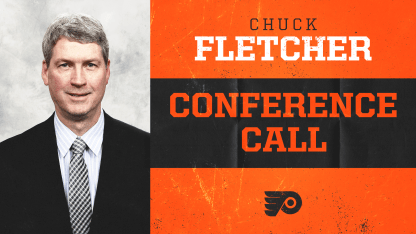
By
Bill Meltzer
philadelphiaflyers.com
Following is a synopsis of the major points Fletcher discussed and player updates he offered during a conference call with Flyers beat writers.
1. Bigger issues at work than hockey
Before getting into team-related matters, the general manager emphasized that society is currently dealing with issues much bigger than hockey itself or sports in general.
"On behalf of our entire organization, and certainly my family and I, we want to thank all the people working on the front lines of this pandemic: the doctors, the nurses,the hospital workers, our first responders, and everyone working hard to keep all our essential services operating for the benefit of all of us," Fletcher said.
The decisions than impact the National Hockey League and the Flyers will be done in accordance with the recommendations of medical experts and the decisions of government officials.
"If we're able to come back and play, that means the world is in a much better spot than it is right now," Fletcher said. " Obviously, I hope we have that ability to finish up this year. A lot of work was put in and we got to the majority of the regular season. I think that we're all competitors and we all want to play. Again, if we're playing that means the situation is changed dramatically and we're in a much better spot."
2. No preferences as to format for the rest of the season and playoffs
The NHL, its Board of Governors and the National Hockey League Players' Association have bandied a variety of ideas about how to conduct the remainder of the season, including expanded play-off formats, possibilities for conducting some or all of teams' remaining regular season games and the possibility of playing deep into the summer with an abbreviated off-season. The NHL must also reschedule the postponed 2020 Entry Draft and determine a format for whether or not it will be held live.
Fletcher said that these decisions will be directly impacted by the pace of progress that is made in combating the pandemic, and the resulting recommendations that the Centers for Disease Control, the federal government, state and local officials make on whether and when it is safe to reopen training facilities and reschedule games at arenas.
"We're fine with anything that they put forward. To me, the more hockey the better. Whatever it ends up being, it ends up being. I'm not particularly wed to anything. There's a lot of ideas out there. A lot of creative solutions. It's a good way to pass the time right now, but until things change and we have more information, it's going to be hard to know what will happen," Fletcher said.
"When you have time, use it. I just think there's no sense in making any decisions until you have to make them. If we're able to come back and play, that means the world is at a much better spot than it is right now. I think that would be a tremendous sign. Obviously, I hope we have that ability to finish up this year. A lot of work was put in and we got to the majority of the regular season. I think that we're all competitors and we all want to play."
3. Everyone is in the same boat
It was particularly unfortunate for the Flyers that the NHL pause was put in place at a time when the team was surging in the standings, and challenging the Washington Capitals for the top spot in the Metro Division.
Now, the team and its player faces the same challenges as every other team in the league: maintaining conditioning levels to the greatest extent possible while still practicing social distancing and minimizing the risk of exposure to -- and potential spreading of -- the Covid-19 virus.
"I think all season we've been showing a high level of resiliency. I think it took us time to get everybody on the same page and to get playing our best hockey, which I think was predictable with the number of changes we made last off-season. I think as the season progressed, we all got on the same page from a system standpoint. Our culture grew and the expectations of the group increased. I think we've become a pretty good hockey team. I think what I like is the buy-in, everybody is accepting of their role and try to do what they need to do to help the hockey team win," Fletcher said.
4. Staying in touch.
Fletcher speaks daily with Flyers assistant general managers Brent Flahr and Barry Hanrahan. They speak directly by phone as well as via group chats. Flahr oversees scouting and NHL Draft prep operations, while Hanrahan handles matters related to salary cap management and Collective Bargaining agreement compliance.
On a weekly basis, Fletcher has kept in contact with head coach Alain Vigneault.
"He had been working on his golf swing for a while, but right now he's like the rest of us, he's going through notes and trying to stay safe," Fletcher said.
The GM also remains in touch by phone, text or email with assistant coaches, scouts, staff members such as director of medical services Jim McCrossin, and those involved in upper-level management including Comcast-Spectacor CEO and Flyers organization chairman, David Scott, as well as senior advisors Bob Clarke, Bill Barber and Paul Holmgren. He's also spoken with James van Riemsdyk, the team's player representative with the NHL Players' Association.
McCrossin stays in regular contact with Flyers players, particularly ones such as James van Riemsdyk and Phil Myers who are rehabbing injuries. Team captain Claude Giroux and the other players on the team have their own group chat, and communicate regularly. Most of the Flyers players, as with players leaguewide, have returned to wherever they make their primary residence during the off-season.
The players, to a man, are doing their best to stay in shape and maintain their conditioning. However, with rinks closed around North America, it is not possible to skate. In terms of general conditioning, some players have more extensive home gyms than others, while others have fallen back on old-school exercises such as push-ups, sit-ups and wind sprints.
"These guys are tremendous athletes and they take care of themselves. I don't know what the exact number would be. Certainly two weeks, in my opinion, would be sufficient [abbreviated training camp time before games resume] to get guys up to speed. Obviously you have normal conditioning and you have game conditioning that may take a little time for guys to get to be where they were when the pause happened," Fletcher said.
Lastly, Fletcher said that he's had a few conversations with a handful of other NHL general managers; not in terms of potential trades but rather as colleagues and friends.
"We have a lot of texts going. Some group chats going. We're communicating a lot, much more informal. I do reach out and speak to about 4 or 5 managers every week. It's only been a couple weeks so I certainly haven't spoken to everybody in the league. Again, trying to stay in touch and see how people are doing. Get ideas for maybe some things that are going. Checking in to see if they are signing anybody. Just things like that. At this stage, it hasn't been a real big factor on what I am doing on a day-to-day basis," Fletcher said.
5. Injury Updates
At the time the NHL pause took effect on March 12, the Flyers had three players on the active NHL roster who were rehabbing recent injuries. Fletcher provided updates on all three players.
Fourth-line center Nate Thompson, who suffered a mild knee sprain on March 10, is now fully recovered and medically cleared. Rookie defenseman Philippe Myers, dealing with a fractured right kneecap sustained on March 7, would be ready to be cleared shortly before or at the start of the playoffs had the regular schedule held. Left winger van Riemdyk,healing a broken right index finger suffered on March 4, is still on target for the initially expected four-to-six week timetable for medical clearance.I
In regards to center Nolan Patrick, who has missed the entire 2019-20 season with chronic migraine disorder but has been working to return to play, the situation remains nebulous.
"Nolan's returned home. Generally speaking, he's feeling well in terms of where he has been over the past few months. That's hard to say what exactly it will mean when we do come back to play. He's been trending in the right direction all along. I don't know if that would have a positive or negative impact other than obviously, the benefit of time that he will have to continue to heal and get back," Fletcher said.
Left winger Oskar Lindblom, who is battling Ewing Sarcoma, remains in Philadelphia to receive treatments. Fletcher reported that Lindblom continues to progress in his fight against the rare form of bone cancer.
Additionally, defenseman Samuel Morin, who sustained a torn ACL early in the season, remains on a rehabilitation program after undergoing successful surgery in the fall.
6. Salary Cap, RFAs and UFAs.
One of the big unknowns across the NHL is what the impact will be on the salary cap for the 2020-21 season. The cap ceiling and floor are tied to hockey-related revenues. As with every NHL team, the Flyers are in a wait-and-see mode when it comes to planning for their salary cap and contract allocations ahead of the off-season.
"We all read what's going on in the world. I think our industry is no different from any other industry. I think there's going to be challenges for everybody as we move forward here," Fletcher said.
"Again, at the end of day, there will be host of issues that the league will have to sit down and come to conclusion on and figure out what makes sense for the industry to move forward. Until we have more concrete answers, it's just hard to speculate on the types of things that we need to be worried about."
Fletcher said that no negotiations have begun as of yet with any of the Flyers impending restricted free agents (RFAs) or unrestricted free agents (UFAs). However, there have been internal discussions pertaining to some of the RFAs and potentially trying to get deals done proactively for players who are clearly part of the plan on an ongoing basis.
The organization recently signed three prospects whose rights would have expired this offseason had they not been inked to entry-level contracts: defenseman Wyatte Wylie and forwards Tanner Laczynski and Wade Allison.
Fletcher said that he thinks both Allison and Laczynski could challenge for NHL spots out of training camp next season. However, neither is a lock to move directly to the NHL without spending some AHL time with the Lehigh Valley Phantoms.
7. Hayes' Impact
Thus far, the gamble the Flyers undertook last summer in trading for the rights to Kevin Hayes and signing him to a seven-year contract has paid off for the organization. Fletcher has said that Hayes has made an impact off the ice as well as on the ice.
"He's a beauty. I think we all knew he had a strong personality, but you are right. He's had a very positive impact on our franchise. He's played very well. He plays a very important role on our team in that second line center spot as well as power play, penalty kill, even strength, 3 on 3 and even shootouts. He's had an impact in every area that a player can have an impact in. He's a good teammate. He's a really good human being. He cares about winning. He cares about the people in the organization. He cares about the fans. You can't make that stuff up. His personality is who he is. He's a real fine human being," Fletcher said.
Following his beat writer conference call, Fletcher did a follow-up session with Flyers website contributor Bill Meltzer, looking more a little more in-depth at Flyers hockey operations during the pandemic and assessments of Draft preparations, the farm system and the current club's depth. Look for a related article here on Tuesday.
Finally, Fletcher did a one-on-one interview with Jason Myretus that will run its entirety on the Flyers Broadcast Network.

